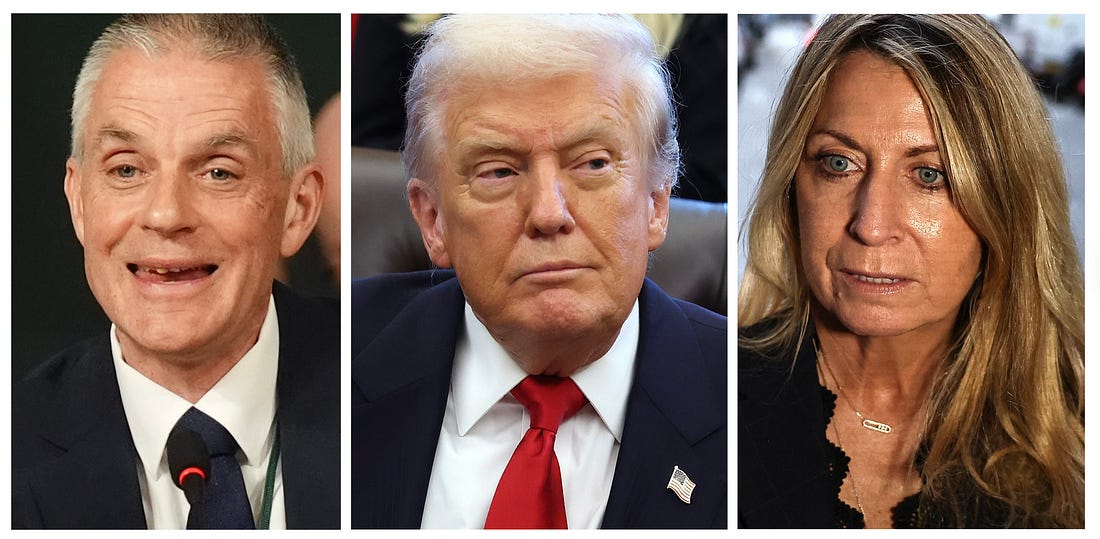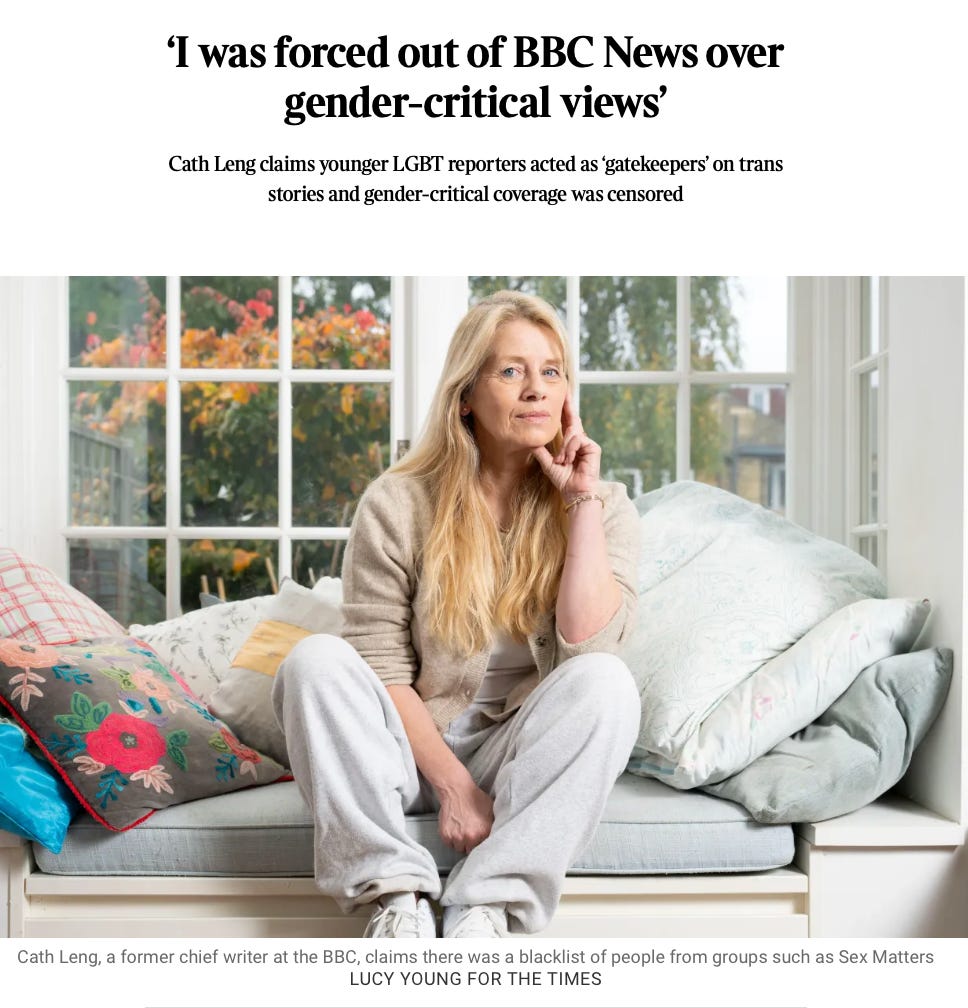Fear, Niceness, and “Gobbledegook” Behind BBC’s Trump, Trans, and Race Scandal
November 10 | Posted by mrossol | American Thought, Censorship, Disinformation, England, Liberal PressAmerican news media companies are just as guilty as the British Broadcasting Corporation. It would not bother me the least if the BBC goes the way of the Pony Express – outgrown its usefulness. Pity the Brits who have to pay for that rot. mrossol
Source: Fear, Niceness, and “Gobbledegook” Behind BBC’s Trump, Trans, and Race Scandal
It’s outrageous that President Donald Trump has threatened to sue the British Broadcasting Corporation (BBC), say many in the media. “You have to admire the chutzpah,” wrote one columnist. “Donald Trump describing the BBC as ‘corrupt’ while threatening to take legal action….The man has never been known for his self-awareness, so it’s safe to say the irony has almost certainly passed him by.”
But there is no question that BBC employees deliberately manipulated Trump’s remarks on January 6, 2021, to make it sound like he had encouraged violence. An independent outside auditor, Michael Prescott, wrote a major report on the BBC’s bias, which concluded that the BBC had “spliced together two clips” to create “the impression that Trump said something he did not and, in doing so, materially misled viewers.”
Americans might think this story doesn’t concern them because it’s about a British media company. Few Americans listen to the BBC.
But the story is highly relevant to Americans because US news media companies are guilty of manipulating their coverage of Trump, transgenderism, and race in nearly identical ways as the BBC.
And given the BBC’s longstanding reputation as one of the most credible news organizations in the world, Prescott’s independent report has rightly sparked a major international media discussion. Over the weekend, the BBC’s CEO and its Director-General both stepped down.
“The Future of the BBC is Now in Doubt,” writes Tim Stanley, an influential columnist, in the Daily Telegraph.
Prescott’s report should inspire reform-minded owners of US news media companies to clean up their act. For example, CNN falsely claimed that January 6 was an “insurrection” that resulted in the deaths of five people and did a similarly manipulative edit of Trump’s speech, noted an investigator on X, @MazeMoore.
“It may not be technically as bad as what the BBC did,” he noted, “because there was a quick flash transition, but the goal was the same. Make the speech sound worse than it was. Take everything out of context and put it together in an order that makes it sound as bad as possible.”
Last year, we criticized CNN and other news media for deliberately twistingthe meaning of Trump’s remarks about Liz Cheney for being a war hawk, and Prescott makes the same observation. “Mr. Trump was clearly criticising politicians who readily send US troops to war without thinking about the human cost,” he notes. And yet “the BBC repeatedly pushed this inaccurate version of what Trump said.”
 |
Readers of Public are aware that we have been critical of the BBC’s fact-checking program, “BBC Verify.” One purpose of BBC Verify appears to be to label stories with which the BBC disagrees as “misinformation” and thus as something that social media platforms should censor.
Last year, the BBC’s Director General, Tim Davie, said, “Disinformation, propaganda, and partial news is [sic] weakening our shared understanding of the world, undermining trust in our institutions and our democratic process,” shortly after the BBC had buried a large package of investigative stories on the problems with giving children and adolescents puberty blockers and cross-sex hormones.
BBC’s first “disinformation” reporter, Mariana Spring, apologized in 2023 after she was caught lying on her resume. Spring remains employed at BBC as its “Social Media Investigations Senior Correspondent.”
Prescott described how BBC Verify spread misinformation.
“BBC audiences were being encouraged to believe Britain’s major insurers were, intentionally or unintentionally, racist and charging high prices to customers based on their ethnicity,” notes Prescott. “The central claim implied causation, (that being an ethnic minority resulted in you being charged more), but the reporting and commentary did not consider other issues that can affect insurance charges.”
Adds Prescott, “the entire report was taken down, which I understand is very rare. It had taken six months for the BBC to take decisive action about a story that was not fit for purpose and spread damaging misinformation. As far as I know, no one has ever been disciplined for this hugely embarrassing episode and worrying questions remain.”
Another example of the BBC’s bias concerned a major story about doctors causing serious harm to children, adolescents, and vulnerable adults. Readers of Public will recall that in the Spring of last year, we released documents, The WPATH Files, which a whistleblower had given to us.
“In March 2024,” writes Prescott, “there was widespread media coverage of leaked documents from the World Professional Association for Transgender Health [WPATH] which raised concerns about the quality of care given to gender-distressed children. It was picked up by the Mail, Economist, Observer, Washington Post, the Times, and others, but not the BBC.”
Prescott points out other examples of the BBC’s censorship and bias on transgenderism. It refused to cover detransitioners, people who regretted taking hormones or receiving surgeries in an attempt to change their sex or gender. It didn’t cover a major lawsuit by a group of nurses after their hospital allowed a man to use their changing room. And, beyond WPATH, the BBC gave little to no coverage of the trans medical scandal, even though the UK government has banned puberty blockers.
By contrast, the BBC produced “a surprisingly high number of stories about drag queens,” celebrated a male wrestler who competed in the women’s category, and published an article last year headlined, “Transgender woman guilty of rape after night out.” Wrote the reporter, “Lexi Secker, 35, of Lowbourne, near Melksham, was living as a man when she attacked a woman in Blunsdon, Wiltshire, on 23 April 2023.”
More information about the scandal may come out. Just today, Cath Leng, BBC’s former chief writer, says she was “forced out” in 2023 after 25 years because she was critical of transgender ideology.
Prescott identified other areas of bias, including on race and the war in Gaza, all of which pointed to a single significant underlying problem.
“My view is that the Executive repeatedly failed to implement measures to resolve highlighted problems, and in many cases simply refused to acknowledge there was an issue at all,” he writes. “Indeed, I would argue that the Executive’s attitude when confronted with evidence of serious and systemic problems is now a systemic problem in itself – meaning the last recourse for action is the Board.”
All of this is deeply damaging to the BBC, regardless of whether Trump decides to sue it.
“BBC staff have destroyed their own trump card in future negotiations over the licence fee,” writes Stanley at the Daily Telegraph. “The problem is this: in the modern, post-TV world, the licence fee is entirely unjustifiable. The BBC has to explain why, when there’s so much else available, it should be allowed to compel us to pay for it – just when tastes are diverging, national identity is fractured and the quality of the BBC’s output is in doubt…”
What, then, explains the BBC’s fall from grace?
Fear, Niceness, and “Gobbledegook”
The first and most important reason for the BBC’s failure is the lack of integrity and cowardice of its executives. They allowed the ideology of left-wing staff members to trump the organization’s ostensible commitment to high standards.
For example, BBC executives gave left-wing gender ideologues control over all trans stories.
Last year, Sally Parkin of Sex Matters sent the WPATH Files to the BBC and never heard back. “At the time, health stories on gender medicine were still being diverted to the LGBT and identity desk,” she said, “so there didn’t seem to be any point requesting a meeting with the BBC as we did for journalists from a number of other outlets.”
In other words, it was widely known in Britain that the BBC had stopped covering transgenderism as a news organization and had become an adjunct to groups that promote transgenderism, like Stonewall, which is the UK version of Human Rights Campaign or GLAAD.
“The offer of a briefing would likely have been declined or gone unanswered,” said Parkin, “but worse, we would have been giving advance notice of a major document leak on gender medicine, under global embargo, to a desk that seemed to do very little except promote transactivist ideas and organisations. The necessary trust just wasn’t there.”
According to Cath Leng, it was younger reporters on the “learning and identity” who were the “gatekeepers” on trans stories. “If it was mentioned that ‘identity’ is aware of this or ‘identity’ says they’re looking at it — that was enough to stop anybody else going anywhere near it.”
Prescott, in his memo, said that, based on his interviews with BBC employees, he concluded that there was “effective censorship by the specialist LGBTQ desk within News.”
Leng told the Times of London that a senior editor deferred to a junior LGBT reporter, “asking him what language they should use, what kind of flag they should use when they’re doing a story about Pride. These people were treated as experts simply because they were believers in the idea of gender identity.”
Leng said an activist group had “influenced the style guide so that it now includes self-identification — you have to use preferred pronouns,” in other words, using pronouns of the opposite sex, simply because someone asked for it. The result was that the BBC falsely claimed, repeatedly, that some men, including rapists and murderers, were women.
Leng’s supervisor demanded that she take down a social media post critical of transgenderism and said, “There seemed to be a blacklist on [trans-critical] people like Sex Matters, Transgender Trend, and LGB Alliance.”
Trans activists had scared BBC employees into complying, Leng said. “Nobody actually has to say anything to you,” she said. “It’s just that opportunities are denied, you get given crappy shifts, you are stuck on the desk rewriting copy.”
Part of the reason transgenderists were able to intimidate senior BBC reporters was through their manipulation of language.
“The reason they [the LGBT desk activists] were considered to have expertise is, of course, because nobody else understands it,” said Leng. “So they’re allowed to spout this gobbledegook and they’re treated as experts when it comes to which language to use.”
At the heart of the gobbledegook is the idea that there is something called “gender identity” that exists separately from, and is more important than, biological sex. Indeed, at the heart of the trans medical scandal is the effort to change bodies to align their appearance to that of the gender identity people have in their heads.
Said Prescott, “too many of [BBC’s] staff have never considered the idea of ‘gender identity’ to be either spurious or offensive to many people.”
However, the language manipulation only worked because BBC executives permitted it. According to BBC’s former Director General, Tim Davie, the reason for BBC’s use of female pronouns to describe male rapists, murderers, and sex offenders was because, in his words, “We have to be kind, and caring, and nice.”
“Tim’s problem,” wrote Leng, who went by the name Cath Walton at the time, “is that he’s being played…. Tim has fallen victim to a narrative that the truth is hurtful, so it’s better to disguise it, or leave it out altogether.”
But behind the “niceness” was cowardice. “He’s not an activist,” said Leng, “but they obviously swim in a sea of activism… We have an Editor-in-Chief who thinks that telling the truth isn’t nice.”
The BBC isn’t so kind to reporters who tell the truth. After Walton tweeted about how calling non-trans individuals “cis-” was pseudoscience, she wrote, “I was put through a lengthy disciplinary process for saying truthful things about sex and gender.”
A similar story can be told about the BBC’s coverage of Trump and racial issues. The media organization sacrificed its commitment to reporting the truth to its commitment to ideology. In the face of aggressive left-wing employees, it sacrificed its integrity and courage, and did so in the name of kindness.
“All this could be sad had BBC executives not been so arrogant about their product, functioning as a welfare programme for middle-class graduates in an organisation that outwardly promotes diversity yet inwardly resembles a feudal hierarchy of luvvies,” writes Stanley. “Good, hardworking journalists at the BBC there are plenty, and it’s always an honour to work with them, but they’ve been let down by a bureaucracy that suffocates creativity in a mass of red-tape and an incomprehensible pyramid of editors that seems to grant even the Archbishop of Canterbury a say in how to broadcast the snooker.”
Competition Is The Best Disinfectant
The left-wing culture of the BBC is all too familiar to anyone who has covered the takeover of major institutions by wokeism over the last decade. In the name of empathy, leftist administrators in academia and journalism in particular have behaved with cruelty toward those who dissent from the progressive ideology. And despite numerous exposés, media organizations and universities —the two institutions most affected—have been remarkably slow to change.
As this story goes to press, the New York Times is already attempting to downplay the broader ramifications of the scandal. The BBC’s “current crisis — the gravest the BBC has faced in decades,” writes the Times’ London correspondent, “is less about Mr. Trump, experts said, than about the insoluble tensions of a renowned public service broadcaster operating in a bitterly divided political and media world.”
The author went on to suggest that the BBC had merely erred in being late with its apology. “The tardiness of the BBC’s apology has baffled current and former employees. Analysts said that if the broadcaster had simply owned up to the error quickly, it might have been able to contain the crisis.”
In truth, the BBC’s coverage of January 6 was little different from coverage by the New York Times and other media, all of which communicated to the public that Trump had attempted a coup or insurrection. None of the media have properly reported on the event, which included the police and other security officers appearing to stand by as Trump supporters walked through the Capitol, most of them peacefully.
Social media, in general, and X, in particular, remain the primary source of alternative news, much of which challenges mainstream news narratives. While much of transgenderism has been debunked, significant aspects of January 6 remain a mystery. The episode highlights the persistent lack of serious investigative journalism into contested events. The potential involvement of the US intelligence community in creating the January 6 riot should be a major story.
The Washington Post, to its credit, reported that the Secret Service had supposedly deleted, accidentally, all text messages between its agents that day, something cybersecurity experts say is impossible.
But most of the media, including the New York Times and CNN, have refused to investigate January 6 properly, and instead relied on the claims of Democrats in Congress and left-wing activists to frame the story as a coup attempt.
The media have behaved similarly irresponsibly on trans and race issues, leaving the public with the false impression that police violence against black Americans is on the rise and that a person can change their sex through hormones and surgeries.
With Prescott’s valuable new report, there is at least now an opening for the truth about January 6, race issues, and transgenderism to reach people who had thought they could trust marquee media brands like the BBC. And so long as the media refuse to change on their own, then desperate measures, such as President Trump filing lawsuits against news media companies, may ultimately be what is required.








Leave a Reply
You must be logged in to post a comment.